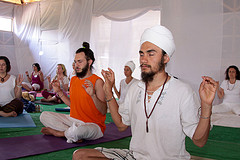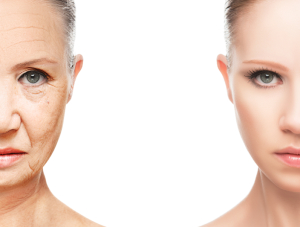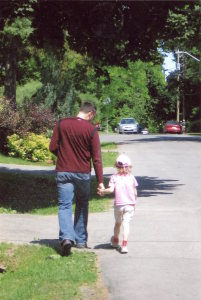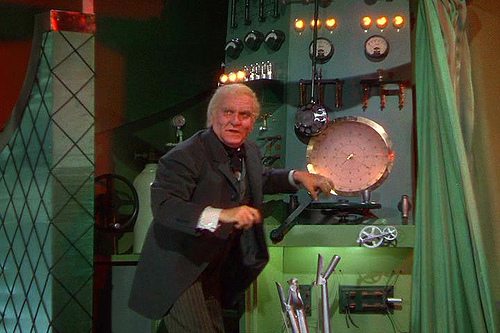Guyside: Do you have recovery time covered in your exercise?
Yoga. How hard can that be, right? Just a bunch women accessorizing and lying around on mats, right?
Uh-uh. As I type this, my large thigh muscles are complaining, and my abdominal muscles are providing harmony vocals. All this after an “ambitious” session of Kundalini yoga on Monday. As in so many instances, my pain is my fault, for two reasons:
- I have had a fairly indolent fall, with not nearly the same level of activity — yoga or otherwise — that I might expect normally.
- Being reasonably competitive and interested in seeing what others were doing in the class, I wanted to show that I wasn’t some Kundalini newbie. So I pushed myself.
And here I sit, waiting for my muscles to stop being mad at me.
Time was that such foolhardiness on my part wouldn’t have been NEARLY as big a deal. Gluttony, sudden spurts of exercise, alcoholic overindulgence, nights with very little sleep — it all was part of the game, and I (or at least I think) was able to perform quite fine under all sorts of self-imposed constraints. Now, it’s a different story. I can have late nights, but there will be a price to pay. The days of 80-chicken-wing sprees accompanied by pitchers of beer? Gone. And as my yoga experience has shown me (not for the first time), I need to gauge my level of effort when exercising and prepare for recovery time.
And it’s not just me. Science says so. An article in the Encyclopedia of Sports Medicine and Science states baldly that “The recommended dose of exercise should do no more than leave the participant pleasantly tired on the following day. Recovery processes proceed slowly, and vigorous training should thus be pursued on alternate days.” And a Harvard Men’s Health Watch article points out (too late for me this time) that it’s best to “Work yourself back into shape gradually after a layoff, particularly after illness or injury.”
This week, I brought my bike in from the garage to set it up for winter training. If I have learned one thing from Monday’s yoga class, it’s that while I can do stuff, I can do stuff better if I do it with an eye to gently bringing myself up to speed, rather than exploding out of the gate.
And the benefits of physical activity are so great and diverse that there’s no argument against moving a bit more. Now, can someone pass the Ben-Gay?
Photo: cc-licenced image from Flickr user Jamie Ramos.
Read MoreGot your skin(care) in the game of life?
Aging skin. It’s worth an occasional sigh, right? After all, at the end of the day, unless you are spending major dollars on a few nips and a few tucks and some filler and peels, well, you have to give into it.
Or do you?
The American Academy of Dermatology has issued a few wonderful tips on taking care of your skin in your 40s and 50s. I thought that I would devote today’s post to things you can do to promote good skin care:
- Protect your skin from the sun. Oh, my goodness; this should be a given at any age. With the surge in products to provide a healthy glow, there is absolutely no reason not to wear sunscreen and every reason to wear sunscreen. And as the AAD points out, protection against the sun is the formation of any skincare plan. The strategy is simple: try to avoid direct sunlight between the hours of 10 am and 2 pm, especially if your shadow looks shorter than you. Wear hats and definitely wear shades. And of course, wear a sunscreen product for the broadest protection possible. Personally, I use EltaMD UV Daily Broad Spectrum during the daytime, which my dermatologist specifically recommended for my skin type.
- Apply moisturizer daily. Oil production in the skin starts to decline around age 40 so moisturizing becomes ever more important thereafter. Many physicians say that the best time to moisturize is right after a shower or bath. Your choice of a moisturizing cream depends on your skin type, your problem areas and your individual make up. I have a mild form of rosacea and consequently, can’t use a lot of products without breaking out. Speak to a dermatologist if you have any questions about what you should use. And be mindful that your product choice may change over time.
- Wash away dirt and grime only twice a day. Did you know that your face washing habits actually affect your appearance? That’s why it’s best to wash with warm (not hot) water and use a mild cleanser in lieu of soap, which can be too harsh as skin begins to thin and lose elasticity. You should also avoid scrubbing too hard, especially if you are acne-prone. Many women experience acne during perimenopause and use and overuse of antiacne cleansers can be irritating. Rather, look for products that are non-comedogenic, nonacnegenic or oil-free.
- Stop smoking. I can’t emphasize this enough. Studies have suggested that tobacco smoke can lead to smoker’s face due to its effect on mast cells (cells that play an important role in fighting allergies and inflammation). Think of the Marlboro Man – rugged looks, i.e. dull and dry complexion, loss of skin firmness, premature lines and wrinkles may look sexy on a 30 year old but by the time you reach your 40s or 50s? Forgeddaboutit!
- Get enough sleep. Oy! This one is tough, especially during menopause. But sleep deprivation can affect the ability of the body (and the skin) to renew itself. Beauty rest? Indeed!
- Finally eat healthy foods and drink plenty of water. The AAD says that a healthy diet filled with fruits, vegs, lean proteins and healthy fats is an important key to healthy skin. And, data suggest that diet can affect multiple skin conditions other than aging, including acne, psoriasis and dermatitis.
Guyside: Being a good man without being a dad
I’m not a father. It’s not gonna happen. It’s not a question of “waiting for the right woman” — I found her over 20 years ago, and that’s that — or of some unfortunate biological malfunction. When my partner and I were together a while, we started to talk about children, and we decided together that we would not have any. And quite a number of years ago, we took permanent steps to ensure that we weren’t going to have children.
First off, there’s the sensitivities that any man sometimes feels about being around kids. You find yourself, at times, in strange situations. A few years ago, friends — let’s call them Dick and Jane — separated. My partner and I were at Jane’s house for dinner, and their daughter “Kate” asked if we could go to her track meet the next day. I could, so I showed up at a school field the next morning, wandering around looking for Kate or Jane. I saw Kate first, and she ran over to hug me, and as she competed, I took some pictures. Then I realized that I was just a random guy with no “real” ties to this event, taking pictures of children. And I also realized that she needed the support of people there rooting for her, and I was proud to do it.
Behind the curtain: sexual health and the culture of trust
[Frank Morgan as Oscar Diggs (aka The Wizard). All rights, MGM 1939.]
Sexual health in women. It’s truly a double-edged, damn if you do, damn if you don’t topic, wrought with landmines and a path paved with…profit. Especially female sexual dysfunction.
Female sexual dysfunction describes an amalgam of symptoms and issues around women and their sexual desire or lack thereof that include: a chronic lack of interest in sexual activity, avoidance of sexual contact, the inability to maintain excitement, difficulty in reaching orgasm after arousal, pain during intercourse, involuntary spasms that may prevent sexual penetration and genital pain following foreplay. A woman doesn’t have to experience all of them to be labeled as having female sexual dysfunction, but she must have at least one and it must cause distress.
Sounds fairly complicated, doesn’t it?
The literature and reams of data have shown that sexual function and desire in women rely on multitude of factors such as context, experience, personal attitudes, emotional closeness, wellbeing, social support and even a sense of purpose. And with the intersection and interaction of these factors, one would imagine it would take a miracle drug to combat more than one of these issues effectively and efficiently. That may be one reason why the FDA turned down the application for flibanserin a few years ago.
The back story on this ‘Female Viagra’ is that it is a antidepressant compound that is is believed to affect brain receptors and neurotransmittors that play a role in sexual response. Data presented a few years back at the European Society for Sexual Medicine conference demonstrated that in clinical studies, flibanserin significantly improved desire, sexual experience and sexual functioning in women when taken for at least six months. The majority of the women participating in these studies were pre-menopausal and had been diagnosed with hypoactive sexual desire disorder (HSDD), a condition that is characterized by a decline in sexual desire, a loss of intimacy, and distress. Yet, the FDA eventually turned down the application because they determined that despite these initial studies, the data, in concert, did not ultimately did not show that Flibanserin improved sexual desire any better than placebo. It was also associated with a number of different side effects.
Fast forward to a few weeks ago, when in response to a concerted lobbying effort by pharma, women’s organizations and even medical organizations the FDA held a two day hearing on female sexual dysfunction. And, while I did agree with that we need to ‘even the score’ to gain women’s health equity (and in so far as female sexual dysfunction goes, provide timely and effective treatments), at least four of the major sponsors of the so-called ‘Even the Score’ movement were major pharmaceutical companies with vested interests. Not surprisingly, one of these companies was Sprout Pharmaceuticals, manufacturer of Flibanerin. And, the plot thickens further…earlier this week, MedPage Today reported that the FDA hearing had an overrepresentation of individuals who had been recruited by drug companies to speak ; many had their way paid indirectly by Sprout.
Why am I sharing this and why are the stakes so great in women’s health? We are living in a time when the culture of trust is being called into question and as I wrote in a related piece on Medium a few weeks back, the culture of trust “is an integral part of women’s health and in no area has the delivery of healthcare been as exclusionary and disjointed.” Despite this gap, women are still the most frequent health information seekers, a behavior which I believe, relies on trust.
A report from the Lancet Commissions group recently stated that,“where profits take priority, the fact that health care functions in the public interest is as contestable as its business prospects are undeniable. Healthcare has, in many countries, become big business, especially when this business sees bodies as commodities to be exchanged and bartered in all of their parts.”
Here’s my point: if the information that is being delivered to women seeking care and knowledge places profit over health, then the culture of trust comes into question. If companies like Sprout Pharmaceuticals or even Novo-Nordisk hide behind the curtains of bloggers, women’s organizations and even some healthcare practitioners to highlight certain ‘diseases du jour’ if not ‘du semaine,’ then the culture of trust, like the system within which it is operating, is broken.
Professionally, I’ve worked with pharmaceutical companies and I understand when the efforts are pure and when they are not. However, be assured that I have never delivered information on this blog that would be considered lined with a conflict of interest. I have kept my promise to you to deliver information without motive. Unfortunately, I cannot say the same of many of my colleagues in the midlife women’s health space. That’s why, dear readers, I’ll be leaving it at the year’s end but more on that later. For now? I cannot encourage you enough: please look behind the curtain. After all, the All Mighty Wizard turned out to be a simple man from Kansas, didn’t he?
Read More
Guyside: What is it that power does again?
Oh yes. Corrupts.
Up here in Canada, people of a certain age and persuasion have been bathed in utter sordidness for the last week, as one of the stories I wrote about last week — that of national radio host Jian Ghomeshi — has gotten worse, and worse, and then worse again.
To recap: Ghomeshi was the host of a nationally-broadcast show on CBC Radio (and on 180 or so NPR stations in the US), a regular contributor to the CBC’s national TV newscast, and a host of a number of high-profile cultural events. He was the personification of an organization seeking a younger, hipper demographic. About a week ago, it was suddenly announced that he was taking an indefinite leave. The immediate assumption was that he was taking time to deal with his father’s recent death.
But by Sunday, he’d written a 1600-word Facebook post that said he was fired, and fired because of revelations of his private sexual behaviour (what he described as being “adventurous in the bedroom”) made by a jilted ex-girlfriend. By now, he’s been the subject of allegations of both workplace sexual harassment and of assaultive behaviour with women in his life, some of whom remain anonymous and some of whom have gone public. His career is in tatters, he’s gone to ground, a Toronto police investigation is underway, his former employer has launched a major inquiry, and a national conversation has begun, thanks to the Twitter hashtag #beenrapedneverreported.
So this is about power. If the allegations against Ghomeshi are true, it seems clear that his power as a media personality allowed him to behave in a reprehensible way with little fear of being “called out” for it. In fact, one producer on his radio show who reported harassing behaviour was allegedly told “he’ll never change, so what can you do to make the workplace less toxic?” by the show’s executive producer.
So here’s the thing. If you are a man who is abusive of women, a sexual harasser, not much I will say here will resonate. But I’ll simply say STOP. Stop what you’re doing. But if you’re not, if you’re horrified by the thought that women are dry-humped in the workplace, that a male colleague would whisper in a female colleague’s ear “I want to hate-f*** you,” etc.: then you’re with me. We need to stop tolerating this in our fellow men. We need to be the sunlight that disinfects the places we work and live to ensure that EVERYone can work and live without fear of assault; we need to be willing to make noise.
If there’s something that this whole tawdry story has taught — or can teach — men, it’s that THIS IS NOT JUST A WOMEN’S PROBLEM. And as I edge toward being a “senior” person in contexts, I’ve realized that while whatever power I possess can corrupt, it can also disinfect, if I have the courage to use it. Who’s with me?
Read More
Trick or… chocolate and memory!
Credit: Mars Chocolate, Hackettstown
Trick???? Or, Treat?????
Got chocolate on your minds today? Before you raid the candy bowl or your children’s haul for the evening, you may want to consider the following:
Halloween chocolate is not going to improve your memory.
I know! It was all over the news.
And, while it is true that study findings appearing last Sunday in the online edition of Nature Neuroscience demonstrated that dietary cocoa flavonals — natural compounds that are found in cocoa –reversed age-related memory decline in 37 people between the ages of 50 and 60, the media didn’t pain the entire story.
The findings…when the researchers administered brain imaging and memory tests to the volunteers given a drink containing 900 mg flavonals, they saw noticeable improvements in both the function of the region of the brain critical to memory (called the dentate gyrus) and in the ability to recognize and recall patterns. They explained that if a person had the memory of a 60-year-old at the beginning of the study, after three months, memory improved to that of a 30-year old.
Pretty cool!
However, here’s the rub: the product used in the study is not the same as commercially-available chocolate; in fact, cocoa flavonals are only found in very small amounts in average chocolate bars. To realize any similar benefits, you’d need to eat about seven dark chocolate bars or 100 grams of baking cocoa daily. And, the study authors say that the amount of flavonals vary depending on processing.
An alternative way to improve memory and dentate gyrus function, at least in younger people, is exercise.
So, the idea that Halloween candy will improve your memory is simply a trick. If you want this treat, you’ll need to look away from the candy bowl!
Read MoreGuyside: dispatches from the men’s foxhole
It’s been a weird seven days up here in Canada. Last Wednesday, a man appeared at our national war memorial and shot to death one of the ceremonial guards, then made his way to our House of Commons (think Congress), was pinned down by security, then shot and killed by our Sergeant-at-Arms. This happened while essentially all of our elected representatives were having weekly caucus meetings within a few metres of where the shooter was stopped. That attack came on the heels of an incident where two soldiers at a shopping mall were run down in the parking lot. One of those soldiers died of his injuries.
Then on Friday, a very high-profile national radio host (think Terry Gross level) named Jian Ghomeshi announced he was taking a leave from his show Q. By Sunday night, his employer, CBC had announced he was fired, allegations of sexual misbehaviour were flying, he published a 1600-word post on Facebook explaining that yes, he was given to BDSM-type behaviour in the bedroom and that this was all the product of a jilted girlfriend, and he was filing a $55-million lawsuit against his employer. Meanwhile, an utter typhoon of drastically divided opinion swirled.
On Monday, a Member of Parliament wrote another note on Facebook (since removed) alleging that an unnamed prominent political reporter had tried to coerce a Hill staffer into sexual improprieties by blackmailing her with embarrassing information that was released when she didn’t accede to his demands.
And yesterday, a video was released of a woman walking the streets of Manhattan to what seemed to be a neverending stream of catcalls and inappropriate come-ons. When I posted the video on my Facebook profile and asked how it resonated with women I knew, the results were not surprising but utterly disheartening — more than a dozen had stories to tell of truly creepy encounters, starting with “hey baby” and escalating to things that would freak me out if they happened to me.
What’s all this have in common? They all revolve around perceptions and expectations of masculinity.
Parliamentary Sergeant-at-Arms Kevin Vickers was widely hailed as a hero for his sangfroid and dignity during and after the shooting incident. The Ghomeshi and unnamed reporter stories highlighted the perception — and the reality — that men in powerful positions are often able to engage in heinous behaviour with little consequence. And the “catcall video” is a vivid demonstration that reality for women is utterly different than for me.
This stuff isn’t “women’s problems” — it’s OUR problem as men, and beyond being a good man myself, I just don’t know how to make a contribution to fixing these problems.
Read More










